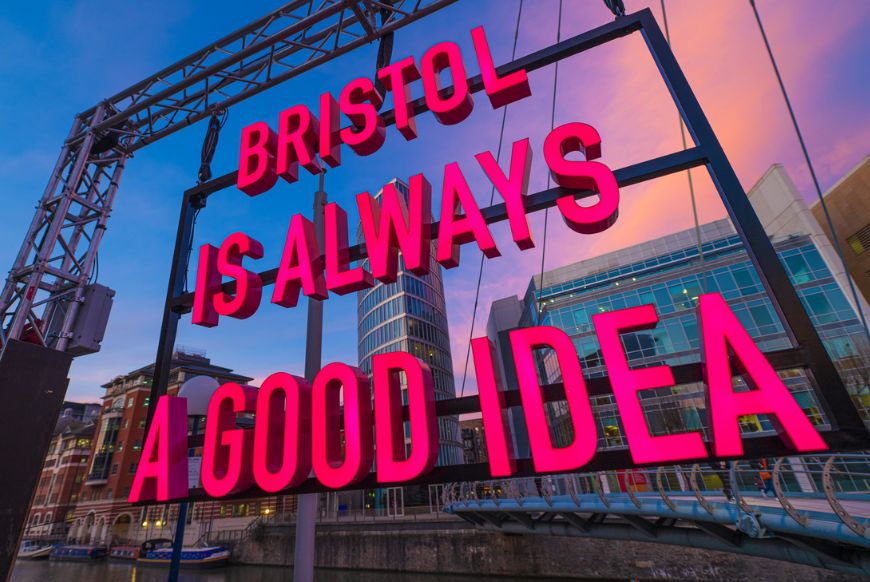Bristol’s new Business Improvement District (BID) officially comes into effect at the start of November, uniting the city centre under one cohesive, business-led partnership - and setting in motion a five-year, £18 million investment programme designed to make Bristol cleaner, safer, greener and more vibrant.
Following a successful ballot earlier this year - backed by 75% of voting businesses and 85% by rateable value - the newly unified Bristol BID brings together the operations of Broadmead, Redcliffe & Temple and Bristol City Centre BIDs. Over 1,000 businesses across the city centre are now represented under one strategic model, with delivery commencing immediately.
The BID will operate across a significantly expanded footprint, stretching from Cabot Circus to Queen Square, from Park Street to Temple Meads and The Triangle to Spike Island, enabling a more consistent, joined-up approach to place management, safety, sustainability and economic development across the full city centre area.
“This is a new way of working,” said Steve Bluff, Chief Operating Officer of Bristol BID. “We’re removing boundaries, uniting our voice and scaling up delivery to better serve the businesses and communities at the heart of our city.”
At the centre of the new BID is a clear and focused framework of four delivery themes. These include ‘Clean & Welcoming’, which prioritises city cleansing, enhancements to public spaces and improving Bristol’s welcome for residents and visitors alike.‘Safe & Supported Communities’ focuses on the wellbeing, safety and resilience of businesses and the people who use the city every day. ‘Experiences & Promotion’ is about delivering events, activations and marketing campaigns that drive footfall and shine a spotlight on Bristol’s unique identity. Finally, ‘Sustainable & Green’ supports environmental action, local greening projects and the city’s wider sustainability goals.
The new BID model is projected to generate over £500,000 in operational savings over its five-year term, including streamlined digital services and back-office functions, which will be reinvested directly into high-impact projects that benefit businesses and the wider city.

Alongside continuing popular initiatives like the Bristol Light Festival, Street Rangers and the Love Bristol Gift Card, the BID will now deliver a broader and more ambitious range of services. These include the creation of a City Innovation Fund to support pilot projects and cross-sector partnerships, and the further rollout of a free Training Hub providing more than 200 digital courses in areas such as wellbeing, leadership, digital skills and workplace development.
Businesses will also benefit from expanded cost-saving support, helping reduce operational bills on utilities, waste and essential services. The BID will work with city partners to improve freight consolidation and sustainable logistics, easing congestion and reducing emissions across the city centre. At the same time, additional investment will be made in climate action planning, supporting SMEs in setting and reaching net-zero goals, while initiatives to support inclusive hiring, digital connectivity and employee engagement will further reflect the evolving needs of Bristol’s economy.
The BID will also continue to represent businesses at the highest level, with ongoing participation in Bristol’s key strategic forums, including the One City Economy & Skills Board, Culture Board, Transport Board, Place Management Group and Sustainable Transport Network - ensuring that city centre businesses have a voice in shaping Bristol’s future.
“We’re not starting from scratch,” Bluff added. “We’re amplifying what already works - and unlocking new scale, stronger partnerships and more visible results. This is about better coordination, more inclusive governance and a louder collective voice for Bristol.”
The BID’s governance structure has also been strengthened to ensure greater transparency and wider business involvement. New working groups are being launched across each of the BID’s four themes, giving levy-paying businesses from all sectors - including retail, hospitality, culture and commercial - a direct role in shaping delivery priorities, funding decisions and accountability.
“Our previous structure has served us well,” said Bluff. “But now’s the time to evolve. With this model, we’re better placed to deliver what matters most to Bristol’s businesses - and to position the city as a national leader in business-led place strategy.”
The new BID term runs from 1 November 2025 to 31 October 2030.
For more information, visit: www.bristolbid.co.uk.
Related
Comments
Comments are disabled for this post.











